|
|
|
Sort Order |
|
|
|
Items / Page
|
|
|
|
|
|
|
| Srl | Item |
| 1 |
ID:
122822


|
|
|
|
|
| Publication |
2013.
|
| Summary/Abstract |
Two decades of aggressive neoliberalisation in Russia has failed to produce a uniform system of private property and profit-maximising enterprises. Instead, the complex interactions of multiple 'practices of property' that are pre-Soviet, Soviet and post-Soviet in origin, and not private property alone, have created a diverse economic landscape. Moreover, multiple practices of property have produced both capitalist economies (such as Moscow's early capitalist enterprises) and non-capitalist, ethically guided economies (such as the indigenous enterprises of Arctic reindeer herders). The persistence of alternative economic logics in Russia illustrates the limits of the role of private property in shaping the post-Soviet economy.
|
|
|
|
|
|
|
|
|
|
|
|
|
|
|
|
| 2 |
ID:
122827
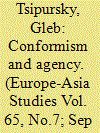

|
|
|
|
|
| Publication |
2013.
|
| Summary/Abstract |
This essay examines newspaper narratives depicting model youth in Komsomol'skaya Pravda in the early 1960s in order to cast light on the Party-state's efforts in the Khrushchev years to use the press as a means of re-energising the drive to forge model communist citizens. In contrast to most studies of Soviet media, this study offers a glimpse of the reception of official signals, by drawing on sociological studies that Komsomol'skaya Pravda conducted of its readers in the early 1960s. Throughout, the paper explores recent scholarly discussions of resistance, conformism and agency in the Soviet context.
|
|
|
|
|
|
|
|
|
|
|
|
|
|
|
|
| 3 |
ID:
122829
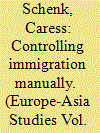

|
|
|
|
|
| Publication |
2013.
|
| Summary/Abstract |
In 2007, the Russian government instituted quotas for immigrant work permits that were consistently lower than actual labour demand. While low quotas are politically popular on the mass level, this article argues that low quotas are also a tool of the government to distribute patronage resources to regional political and economic elites. For several years after quotas were instituted, they remained quite controversial, and during this time decisions about them were firmly in the hands of Vladimir Putin, first as president and then as prime minister, giving him a powerful tool to control the immigration process and labour market manually. While this type of manual control is effective in the short term to manage contentious policy arenas, it suffers a number of possible long-term consequences.
|
|
|
|
|
|
|
|
|
|
|
|
|
|
|
|
| 4 |
ID:
122825
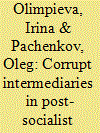

|
|
|
|
|
| Publication |
2013.
|
| Summary/Abstract |
Using the example of intermediaries in business-state relations, this essay addresses the evolution of corruption in Russia which has been facilitated by the introduction of a neoliberal system of market relations. Based on empirical studies of small and medium-sized enterprises in Russia, the essay demonstrates how intermediaries (which are also present in Western market economies and serve the function of reducing firms' transaction costs) have adapted to the local system in order to serve as providers of both legal and illegal (corrupt) services. Disputing the pervasive claim that neoliberalism and corruption are mutually exclusive phenomena, we argue that in 'incoherent' democracies like Russia, where properly functioning democratic institutions and a developed civil society are lacking, neoliberalism has led to the expansion of corruption.
|
|
|
|
|
|
|
|
|
|
|
|
|
|
|
|
| 5 |
ID:
122826
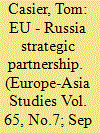

|
|
|
|
|
| Publication |
2013.
|
| Summary/Abstract |
Russia-EU relations have often been presented in terms of a normative gap, with the EU appearing as a normative and Russia as a non-normative actor. This article critically analyses this 'normative argument' which sees this gap as the cause of tensions. Pleading for a less dichotomous approach to norms and interests, it challenges the normative argument on the basis of the assumed congruence between the norm-driven input and norm-promoting output of European foreign policy. As an alternative, the article explores how the normative agenda in Eastern Europe serves instrumental purposes. Selective norm promotion has the potential to change the hierarchy of identities among post-Soviet states.
|
|
|
|
|
|
|
|
|
|
|
|
|
|
|
|
| 6 |
ID:
122820
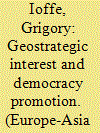

|
|
|
|
|
| Publication |
2013.
|
| Summary/Abstract |
To become successful, the American policy of promoting democracy abroad needs to be scaled down and decoupled from geopolitics. In the post-Soviet world, the democracy-geopolitics doublespeak breeds cynicism and achieves mixed results at best. Particularly discouraging are the outcomes of democracy promotion in the so-called cleft countries, straddled by a cultural divide. In Ukraine, American foreign policy achieved some success at the price of intensifying inter-regional antagonisms, which subsequently compromised and offset the progress that had been achieved in democratic forms of governance. In Belarus, democracy promotion failed altogether because inter-regional antagonisms in that country are too modest and are therefore difficult to leverage.
|
|
|
|
|
|
|
|
|
|
|
|
|
|
|
|
| 7 |
ID:
122828
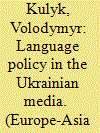

|
|
|
|
|
| Publication |
2013.
|
| Summary/Abstract |
This article deals with language policy in one crucial domain, the media. It treats language policy as the interaction between actions or inactions of the authorities, producers and consumers contributing to change or continuity of existing practices. It is argued that the main long-term contribution of all three actors, despite some notable changes, is the maintenance of the status quo characterised by the coexistence of Ukrainian and Russian with the predominance of the latter language. In particular, consumers mostly maintained their accustomed language preferences, although they did not resort to any protest actions when those preferences were disregarded.
|
|
|
|
|
|
|
|
|
|
|
|
|
|
|
|
| 8 |
ID:
122819
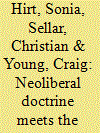

|
|
|
|
|
| Publication |
2013.
|
| Summary/Abstract |
THIS COLLECTION EXPLORES HOW NEOLIBERAL IDEOLOGY-and related economic policies-have been implemented in the once-socialist countries of East Central Europe and the former Soviet Union. Specifically, it argues that this ideology undergoes deep modifications as it meets post-socialist conditions: sometimes it is creatively appropriated, sometimes resisted and sometimes 'purified' (in that it is implemented more thoroughly than in the Western nations where neoliberalism as an ideology was developed). Thus, the collection illustrates how 'actually existing neoliberalism', to use Brenner and Theodore's (2002) terminology, occurs 'on the ground'. It argues that the 'actually existing neoliberalisms', which have developed in a variety of post-socialist contexts, can differ profoundly from the theoretical constructs propagated by neoliberalism's supporters, including the major international financial institutions such as the International Monetary Fund and the World Bank. As recent literature on policy mobility makes clear 'It is already widely recognized that it is rarely possible to transfer policies directly, precisely because they emerge from and are responses to particular "local" sets of social and political conditions which are not replicated in the places to which they are transplanted' (Cochrane & Ward 2012, p. 5).
|
|
|
|
|
|
|
|
|
|
|
|
|
|
|
|
| 9 |
ID:
122824
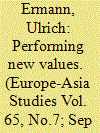

|
|
|
|
|
| Publication |
2013.
|
| Summary/Abstract |
In post-socialist societies, marketing and consumption play a crucial role for what is regarded as value. Assuming 'consumer capitalism' as an important feature of the neoliberal project, I argue that marketing theories and practices produce market societies in Eastern and Central Europe. To highlight the reflexive adaptation of 'consumer capitalism' by producers, marketers and consumers, this essay discusses fashion brand promotion in Bulgaria. The case studies illustrate how the transformation of modes of valuation can be understood as a process of performative modernisation and marketisation. It appears that the 'local' adjustment of 'global' concepts of marketing and consumption leads to new formations of value in spatial, temporal and subjective terms.
|
|
|
|
|
|
|
|
|
|
|
|
|
|
|
|
| 10 |
ID:
122823
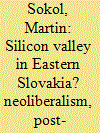

|
|
|
|
|
| Publication |
2013.
|
| Summary/Abstract |
The essay critically examines the prospect of emulating a Silicon Valley-style regional development in the post-socialist context of East-Central Europe. It underlines the problematic nature of the Silicon Valley concept itself and examines the way in which the concept has been 'domesticated' in Košice, a peripheral region in eastern Slovakia undergoing a painful post-socialist transformation towards the market economy. In doing so, the essay also highlights links between neoliberalism, post-socialism and the knowledge-based economy.
|
|
|
|
|
|
|
|
|
|
|
|
|
|
|
|
| 11 |
ID:
122821


|
|
|
|
|
| Publication |
2013.
|
| Summary/Abstract |
In most parts of the post-socialist world high expectations regarding privatisation were quickly disappointed when it became obvious that property practices did not follow the ideal type predicted by market models. The article addresses this divergence and emphasises the necessity of overcoming the dualism of an ideal type of property rights on the one hand and the way property is handled in everyday life on the other. It argues that concrete situations as well as the necessary justifications of practices have hitherto both been widely neglected as empirical foci in studies on property relations. Five brief episodes from the privatisation of collective farms in rural Russia serve as examples to illustrate how situations and justifications are reflexively linked by drawing on and negotiating about differing 'orders of worth'.
|
|
|
|
|
|
|
|
|
|
|
|
|
|
|
|
| 12 |
ID:
122830


|
|
|
|
|
| Publication |
2013.
|
| Summary/Abstract |
Previous research has reported substantial levels of nostalgia for the Soviet era among citizens of some of the independent republics that emerged from its collapse. We report new analyses from eight former Soviet republics, and from two surveys, in 2001 and 2010, comparing attitudes to government in the Soviet period and at the time of the surveys, as well as expectations for the future. Everywhere, views of the past have become less positive and those of the present more positive. However, both the views in each survey and the change between each of them vary among countries and socio-demographic groups.
|
|
|
|
|
|
|
|
|
|
|
|
|
|
|
|
|
|
|
|
|